Living Room Dialogue: Recalling the moment in pictures and reflection
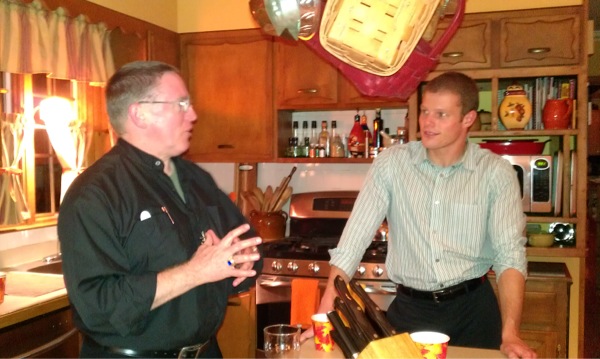 Fr. Tom chats with Kevin in the kitchen after the presentation and dialogue.
Fr. Tom chats with Kevin in the kitchen after the presentation and dialogue.
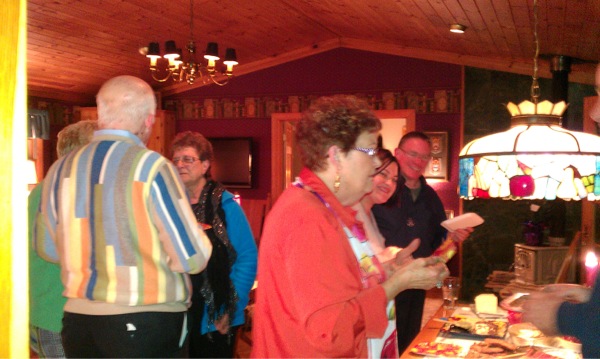 Living Room Dialogue participants continue the conversation over some food and drink. What's a conversation with something to eat?!
Living Room Dialogue participants continue the conversation over some food and drink. What's a conversation with something to eat?!
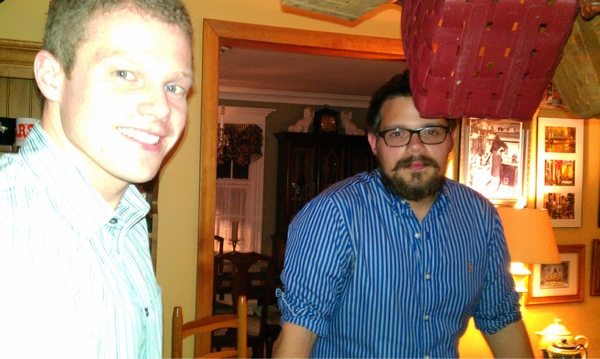 Kevin works in finance; Tim works in education. Great being with you!
Kevin works in finance; Tim works in education. Great being with you!
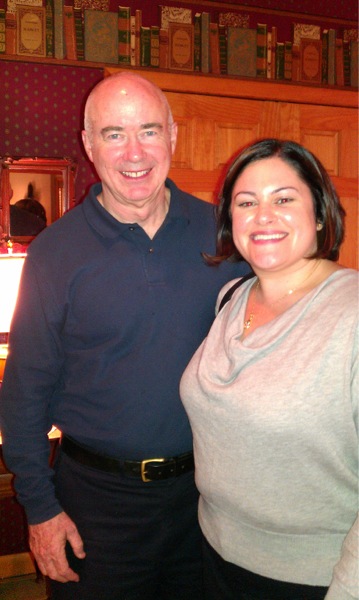 Participants Fr. Hugh Cleary, C.S.C. and MaryAnne Cappelleri, Stonehill College Campus Ministry. Welcome voices in the dialogue.
Participants Fr. Hugh Cleary, C.S.C. and MaryAnne Cappelleri, Stonehill College Campus Ministry. Welcome voices in the dialogue.
"The people of God believes that it is led by the Spirit of the Lord who fills the whole world. Impelled by that faith, they try to discern the true signs of God's presence and purpose in the events, the needs and the desires which it shares with the rest of humanity today. For faith casts a new light on everything and makes know the full ideal which God as set for humanity, thus guiding the mind towards solutions that are fully human." Gaudium et Spes, 11. Second Vatican Council, 7 December, 1965.
Living Room Dialogues (LRD) began in the '60's in the wake of the changes brought about by Vatican II and the documents that it produced. Those discussions led to the full, conscious and active participation of people at prayer because those same people became involved and invested in the dialogues. They felt welcomed, comfortable, free to ask questions and voice opinions. The moderator led the conversations to explain Mass changes, break open the documents of the Council and lead a dialogue surrounding an area of interest in worship, social justice, education, health care, etc., through the lens of Christian witness. Those same people took the show on the road into the public marketplace and lived what they learned in tangible ways to create change for the social good of all people.
50 years later, the dialogue revolving around full, conscious and active participation seems to be unraveling by a slow un-doing of what the Spirit prompted through the Council. In a report called Nones on the Rise from The Pew Forum (www.pewforum.org), statistics produce a bleak picture of the ecclesial landscape. I am not alone in my belief that people will only be full, active and conscious participants in anything when they feel that their voice and opinions are taken seriously and add weight to the conversation and its outcomes. How do we connect liturgy and life beyond the parking lot after Sunday worship and take Christ to the world with the fire of Pentecost in this time and place?
In these turbulent times with many issues resting on how we think as a Christian community, Living Room Dialogues create an opportunity for open discussion and action within an environment of Christian prayer and hospitality. Small ecclesial communities sparked a fuse that lit a lot of dynamite in the years following the Council. This is a different century but no less infused with the Spirit of God who wants to break into the conversation and unleash a new revolution of Christian animation and change. "Pour forth your Spirit O Lord and renew the face of the earth." Do we really mean that or is it just notes on the pages of a psalm and liturgical correctness when we sing those words?
On October 11, 2012, the newly established Roncalli Center's first Living Room Dialogue drew about fifteen people from all professions between the ages of 25 and 70. From newspaper publishing, finance, health care, education, pastoral ministry, social services -- all participants added their voice to the dialogue that followed Fr. Tom Gaughan, C.S.C.'S inaugural talk.
Fr. Tom posed a question based on what prompted Pope John XXIII to call a council three months into his papacy. Fr. Gaughan asked, "Do we invoke the Spirit when we pray?" He talked about how we respond to the invitation of the person of the Spirit who evokes, invites and motivates a community's response by breaking open the person of Jesus, God's Word alive and in our midst. "The Spirit is always with us, like the air that we breathe," Fr. Tom said. "Veni Sancte Spiritus" was the take away that evening, with that prayer of Pentecost infused on the minds and hearts of the participants.
A lively conversation followed, ending with a really big question: "Where do we go from here?" That's a question that the bishops and peritus probably asked when they nixed the original documents sketched by the Curia. "Oh no. We're starting again. We need to talk about this and ask for the Spirit's direction." And they did. And look what happened.
In a follow up conversation with Fr. Tom, we arrived at a conclusion that people need to experience great liturgy in preaching, presiding, music, robust symbols and wholehearted participation. That includes pastoral ministers who are responsible for the prayer of the people and what the Council called the source and summit of our faith - the celebration of Eucharist.
To this end, the Roncalli Center will act on behalf of all liturgical ministers through days of study and prayer surrounding the documents of Vatican II, including break out sessions for all liturgical ministries with workshops on preaching, presiding, music and other liturgical ministries. Beginning with a celebration of the Liturgy of the Hours and ending in a robustly celebrated Eucharist, those events serve to inspire and teach, encouraging ministers to continue to do the hard work of the Gospel in their own pastoral settings.
However, I really believe that the Roncalli Center needs to go further, dig deeper and outreach further casting a wider net that embraces more than the people who serve as ecclesial ministers. A foundational principle from the Second Vatican Council contends that the liturgy, particularly the Eucharist is the source and summit of the life of the Church that extends from that centrifuge into daily living. That thinking begs questions. What about those who live on the periphery of church life? What about those people who include themselves as members of the Church but do not wholly participate in its liturgical life? How do we include their voices in the dialogue? Their numbers are legion. And why would we expect those members, or anyone for that matter, to participate in any of the dangerous counter cultural mission of Christianity without offering them an opportunity to weigh in through dialogue and voice their opinions and share their stories?
I find that this is particularly true in young people who are already suspicious of institutions and organizations on the whole. Where will they find collegiate community, mutuality, respect and recognition when they speak up and voice their opinion? And I find that my own generation of mid-lifers didn't do a particularly great job at handing down a faith tradition to their children, a missed opportunity and deeply regretted by people who cannot wish the tide back onto the shore when its out to sea. When a crisis kicks in - let's face it, we all face them in one way or another - people who have turned from faith and others who have no faith attempt to find that interior strength that can only come when firm foundations are laid on something other than the sand of contemporary culture. Can honest dialogue with small ecclesial communities draw them into a life of faith?
We learn from one another, through a mutual exchange where we meet the living God. How does our faith shape how we vote in a national election? How does our faith inform how we work with local government? What about Christian ethics in media, finance and social enterprises? Choices in health care, beginning and end of life issues, marriage, sexuality? How do the documents of Vatican II act serve as very real guides in ways to think and act about these issues in full, conscious and active participation in the way we live our lives as Christians sent out to the world with the mission of Jesus? That's not new. That's been the work of every baptized person who follows the person of Jesus Christ.
Leaders who listen to the dialogue of people and act as a result born from that wisdom seems to be a diminishing skill. That's not a judgment on my part but a comment based on my conversations with both lay and ordained ministers and a lot of people that I meet and talk with in pubs, in the gym, in hospitals and nursing homes, in church, in schools and around the kitchen table. I believe that dialogue and feedback is the only way for any of us to take the pulse of the people we encounter. People will fully participate in something in which they fully invest. If people remain silent or unheard, they will simply not participate in liturgical worship, in service and Christian mission. Worse, people will participate as silent objects at worship rather than people of worship.
Living Room Dialogues offers people the opportunity to be heard, to ask questions and listen to one another as they share their own narratives, opinions and views. They also provide a conversation to show where the Conciliar documents have affected church life throughout 50 years within areas of scripture study, faith formation, liturgical practices, health care, ecumenism, education, social services, government - in every corner of society and throughout the world. In this landmark year, we can seize a moment together and become something new, a people on fire with the flame of the Spirit. Believers and inquirers, ecclesial ministers and those who have been away or are hungry and searching for faith and dialogue with community have an opportunity to examine the influences of the Second Vatican Council discern its effects on public and private life and envision a hope for the future of the world. Are we ready for a new Christian revolution of dialectic deepening through conversation as we crack open the Documents of Vatican II to absorb their prophetic vision in day to day living? How will the Spirit speak to us, move us, change and renew us?
Christ continues to speak to us in this time and place, through Word, table and through one another. The Spirit of God invites us to ignite the flame of Christian witness that embraces the seeker, strengthens the weary, bolsters the despairing, consoles the bereaved, hears the cry of the poor and acts on their behalf. A human solution through divine prompting to fill the whole world. Sounds like a good plan. So where do we go from here?
Second Living Room Dialogue
The Rite of Christian Initiation - the heart of evangelization
Monday, November 12, 2012 at 7:00 pm
at
157 Stevenson Street, New Bedford, MA
RSVP to
roncallicenter@gmail.com by Sunday, November 11, 2012.
The Second Vatican Council restored the catechumenate, which consists of the steps and stages that are integral to the Rite of Christian Initiation of Adults. The catechumenate is a way of being church, of ministry and of mission. It requires the work of the entire church. More specifically, the catechumenate requires collaborative team work of an entire parish, which hands on the tradition to the people who seek faith through the prompting of the Spirit. It is the work of the faithful first, followed by a well formed leader and a well formed team to develop and implement the Rite of Christian Initiation. A robust catechumenate has the power and potential to change a parish.
Don't take my word for it! Come to the next Living Room Dialogue and deepen your understanding of the conversion journey. Hear the compelling stories from an experienced pastor and well formed leaders of a catechumenate team that will help you to implement the initiation process in your own parish. Emphasis on the relationship of good liturgy to good catechesis will be highlighted. A nuts and bolts session for everyone. If you're coming from work, food is served. All are welcome -- bring a friend!
Presenters:
Michael and Kathy Sites from St. Anthony/St. Rita Parish in Mattapoisett, MA with Fr. Paul Caron, pastor.
I included several pictures from their recent Rite of Acceptance. A profoundly moving liturgy.
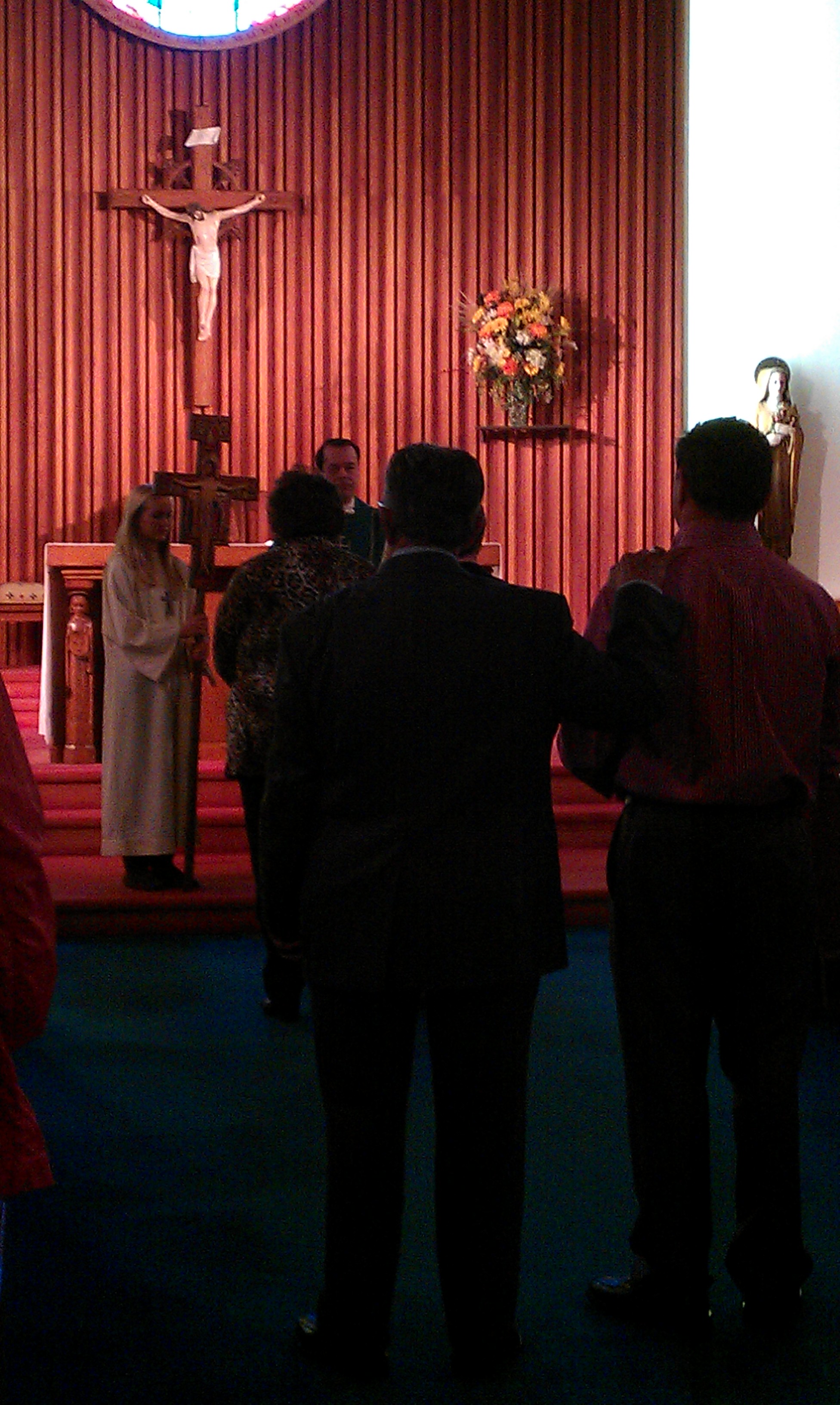
The community blesses and sends the newly accepted catechumens to break open God's word.
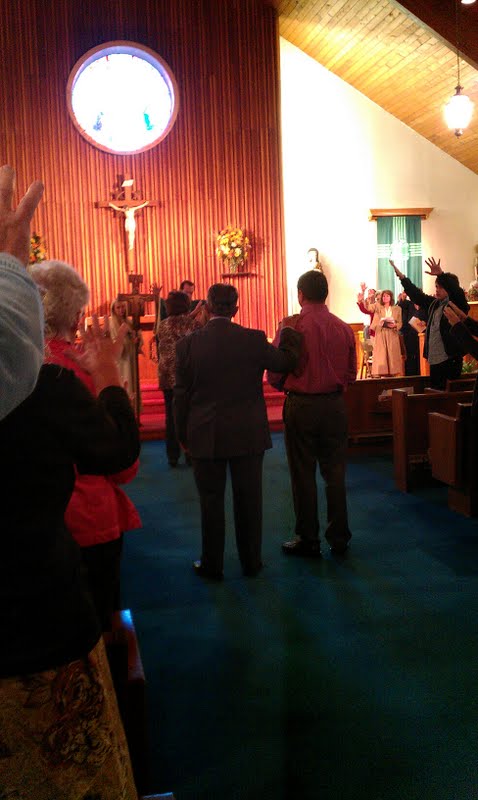
The catechuments, holding their newly received Bibles, are dismissed with their leaders to discern God's word in their lives.
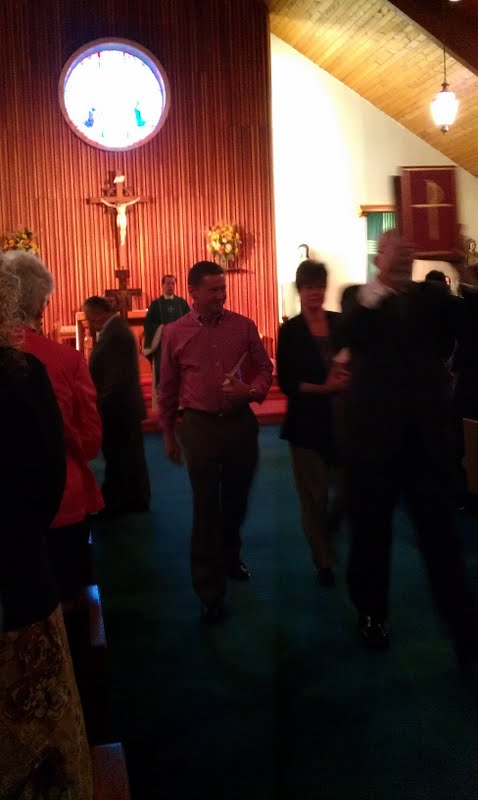
 Denise Morency Gannon
Denise Morency Gannon
Reader Comments